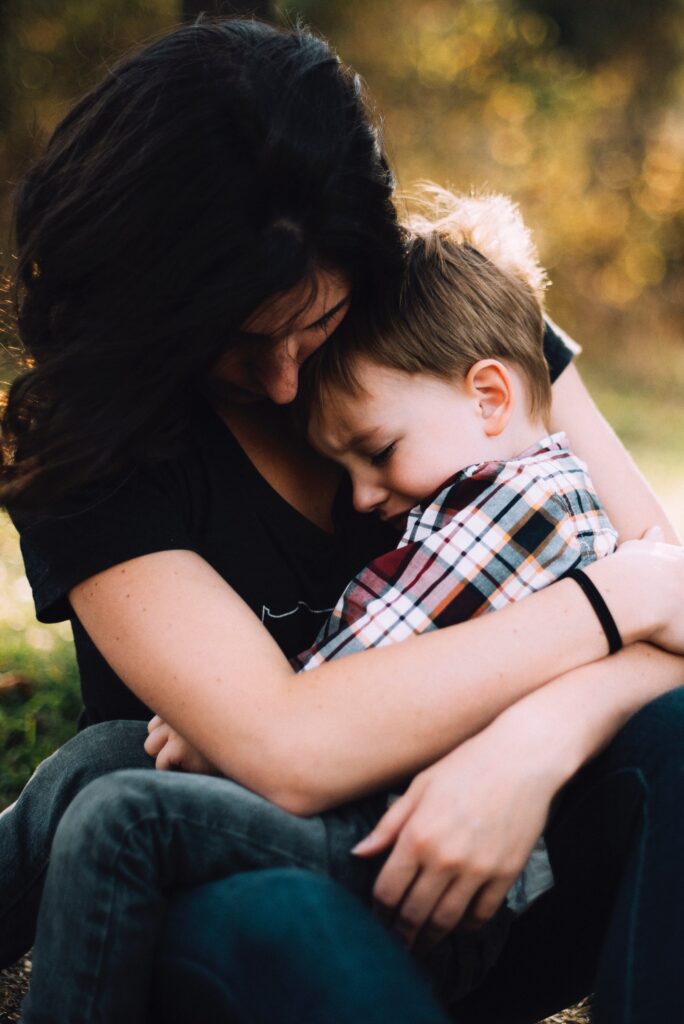
So your child is struggling with Separation Anxiety. What are you supposed to do? What are you supposed to say? Aunt Sally says that you coddle her too much. The neighbor says you should ignore her crying and be more firm. Your mom is telling you that it is because she’s your first born and you picked her up every time she cried.
So many opinions! It is overwhelming and, not to mention, shaming and alienating. You feel like you’ve failed your child and you’re too embarrassed to talk to anyone about it for fear of finding out that it was really you who messed up your child.
I’m here to tell you that it is not your fault. You’ve done your best with the tools you have. From here on out, the best thing to do is continue to equip yourself and continue to learn ways to support your child, while also taking care of yourself.
Signs of Separation Anxiety
Separation Anxiety is when a child experiences excessive distress when anticipate or experience separation from primary caregiver, which is usually mom. They may exhibit the following symptoms:
- Excessive worry about separation from caregiver
- Excessive worry or fear that something bad will happen to caregiver
- Fear of sleeping without caregiver
- Fear of getting lost or being kidnapped
- Fear of being alone
- School refusal
- Persistent nightmares
- Difficulty concentrating
- Difficult with social interactions
- Isolation
- Irritability
- Physical complaints (stomachaches, headaches, nausea, etc.)
Contributing Factors
Both genetic and environmental factors are contributors to Separation Anxiety. Studies have shown that some of the following environmental factors may increase the risk of Separation Anxiety:
- Losing a parent through divorce, separation or death
- Parent having an anxiety diagnosis
- Parent suffering from alcoholism
- Being adopted
- Conflict between parents
- Low warmth in the parent-child relationship
- Parental absence for an extended time
4 Things You Can Do to Help
1. Prepare Your Child for the Separation
This can be tricky to do. You don’t want to start talking to your child about having to separate from you, weeks or months in advance, but you also don’t want to tell them 5 minutes before you have to go. Starting the conversation a day or two before you have to separate will give them enough time to start thinking about it, but not so much time that they will be ruminating on it and increasing their anxiety.
When you talk to them about it, you can talk about where you will be going, where they will be staying while you are gone and who will be taking care of them. Together, you can make a plan for making them feel comfortable and making sure that they will have everything they need. You should also let them know, approximately, how long you will be gone, if that is possible.
2. Practice
Practice doesn’t make perfect, but it does make better. The more you practice small separations from your child, the better your child will get at it. They will start to see that everything went well and that their fears didn’t come true.
You can practice leaving them with the other parent or caregiver while you take some time to yourself in another room in the house so that they know you are near and that they are okay with the other parent or caregiver. You can also go on quick errands while they stay with another caregiver. You’ll want to let them know what time you’ll be back and call to notify them if you’ll be late. Slowly, you can start stretching the time. It’s important that this happens gradually in order to not overwhelm your child, but to offer them opportunities to experience lower levels of anxiety and feel empowered at overcoming the struggle.
2. Give Them a Tangible Reminder of You
Kids do great with tangible reminders! You can leave them with an item that will remind them that you are thinking of them. This can be your necklace, a picture of you two, a drawing made just for them, a special stuffed animal you both picked just for times when you have to be apart. It can be anything as long as you both give special meaning to it.
3. Create Rituals
Rituals are very important in reducing anxiety and creating connection. Rituals are things you do repeatedly that have meaning for you both. This can be a special song that you sing before bedtime, a special way to say goodbye, a bedtime routine you always practice. It can be anything that enhances connection and happens at the same time. Creating and establishing these rituals will help create predictability and enhance feelings of safety and connection, therefore reducing feelings of anxiety and fear.
4. Create a Safe Space to Talk About Feelings
Make sure that you are making time and space for your child to talk about their feelings. They need to feel heard and understood by you in order for them to not feel alone with their anxiety. Feeling alone will only increase the feelings of anxiety. Talking about feelings can be as simple as asking your child how school was or how they felt when they were apart from you and allowing them to cry and express their feelings. It is important to you don’t tell your child that they should not feel this way and that you simply accept their feelings without trying to change them. Once they feel heard, they will be ready to brainstorm ideas on how to cope with the anxiety.
If you struggle with how to do this, I have created a printable workbook for children who struggle with separation anxiety. This workbook is meant to be used by the child, alongside the parent, not for the child to use on their own. It includes activities that help the child put words to the feelings they are experiencing and activities that they parent and child can do to increase feelings of safety and ease the child into being able to separate form you. I also included check-in worksheets for the child to fill out after they reunite with you. These worksheets will help your child explain what they experienced while they were away from you and help them create a plan for what they will do next time they are apart from you.
Final Thoughts
Separation Anxiety can feel like too much to deal with. If it is mild, you can use the tools in my workbook to help ease transitions and separations. If your child’s separation anxiety is moderate to severe, it is important that you seek help from a mental health professional. There are mental health therapists who are Play Therapists and specialize in working with children through the use of Play Therapy. Therapy does not have to be intimidating and can be a safe place for your child to workout their fears and anxieties.
